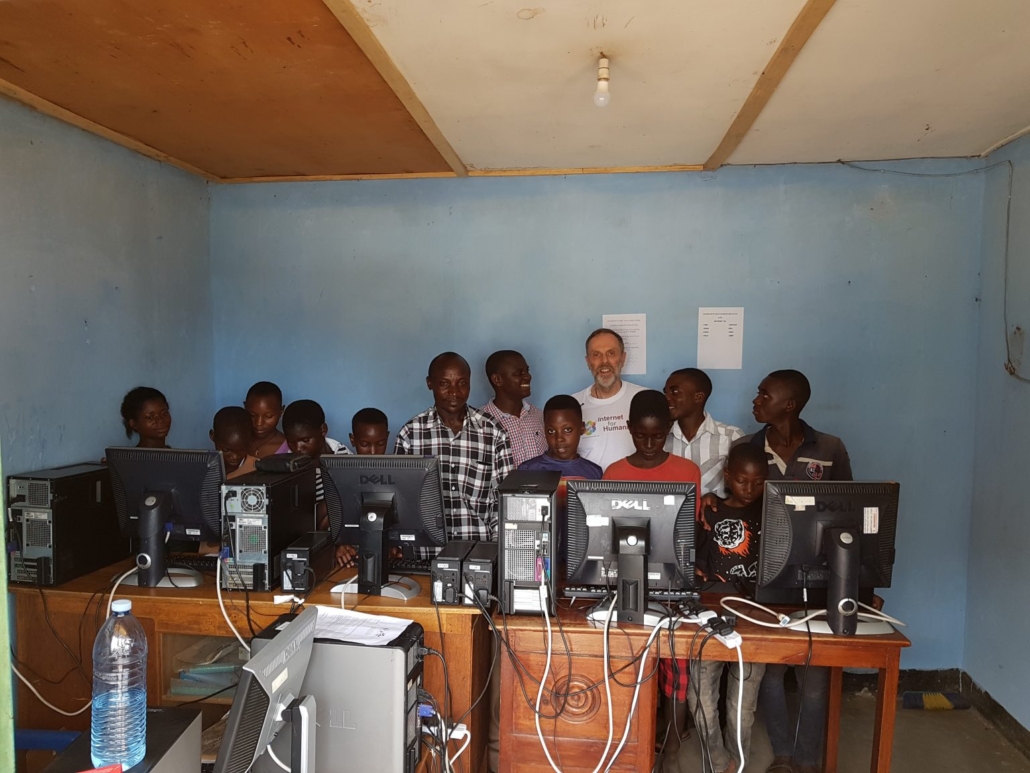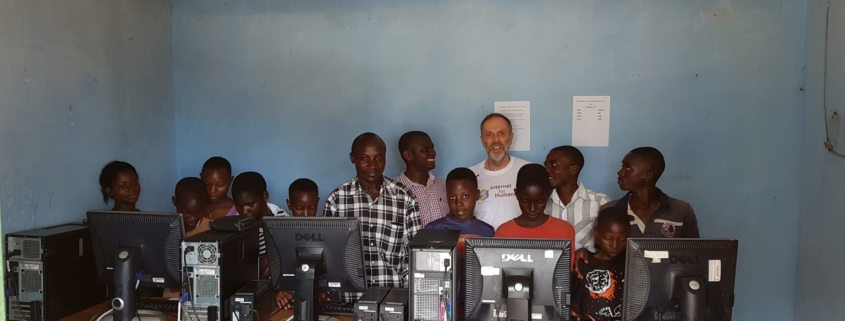A Canada Gives Donor Story: Internet for Humanity connects rural Africa to the web

One of the many advantages of a Canada Gives Foundation account is the flexibility and ease of use that the structure offers to philanthropists. In our latest Donor Story, we explain how Canada Gives donor client Robert Porter—after being introduced to our organization by his financial advisor—used a donor advised fund at Canada Gives to more easily fund his existing operating charity and other non-profit passion projects. Porter has leveraged his giving goals and activities to great success to grow Internet for Humanity, an organization dedicated to enhancing internet access across rural Africa. Here’s how he’s tapping digital connectivity to change lives for the better.
————————————
Robert Porter has long held a love for adventure and a passion for giving back to underserved communities. Those two interests came together in 1996 when he and his family were travelling through Angola—one of the world’s poorest developing countries—which at that point was in the throes of a decades-long civil war. During their journey they met engineer Nzolantima Swasisa (Nzola), who was using HF radios to send emails and wanted to leverage the technology to amplify internet connectivity in his native Democratic Republic of Congo. The pair struck up a friendship and the early seeds of the charity Internet for Humanity—then known as Radio-E-Mail Connections Unlimited (REMCU)—were planted.
Fast forward two years and the Porter family had returned home to Victoria, B.C., where the goal of using HF radios to expand internet access was still fresh in Robert’s mind, but the question of ‘how’ loomed large.
Destiny took hold when Nzola decided to study electronics in the B.C. capital. He reached out to Porter and the benevolent technology enthusiasts rekindled their discussion. They soon articulated a broader, more detailed vision for their fledgling charity: bringing low-cost, reliable internet and email to the most remote parts of Africa. They endeavoured to supply NGOs, humanitarian organizations, schools, hospitals, cooperatives and community organizations with the digital connectivity needed to educate and support community economic growth.
“We installed a pilot system in Zambia connecting eight different remote sites,” Porter recalls. “That project ran from 2004 to 2010 and in that six-year period, cellphones took over Africa.”
REMCU switched from using HF radios to cell data for email and web-browsing —the former was 10 to 100 times more expensive than cellphones. In 2011, REMCU was invited to install a computer lab at a high school in Uganda. The biology teacher, Robert Tabula, was so impressed by what internet access could do for schools that he returned to university for a degree in information technology. He volunteered to maintain REMCU’s first installations.
In 2016, REMCU officially rebranded as Internet for Humanity (I4H). Tabula and his wife Moreen remain the heart and soul of I4H. They now support eight co-ops, and more than 100 schools and vocational institutions in Uganda.
The impact of their work has been transformative, elevating the fortunes of farmers, and enhancing students’ education in unprecedented ways. Porter estimates that after recently negotiating improved pricing from the local internet service providers, nearly 150 I4H-supported schools have access to unlimited data for about $10 USD per month, with more than 200,000 children benefiting from internet access at any given time, to complete their education (a typical rural Uganda school has about 1,500 pupils, who have access to only a handful of computers).
Tabula has fully trained a team of five technicians to install and support systems across rural Uganda. The goal is to continue expanding coverage across Uganda and other underserved areas of rural Africa—partnering with communities along the way. As part of the organization’s contract structure, a prospective I4H beneficiary (e.g., a school) must agree to pay 25 per cent of the equipment cost (one of five computers and one of three power supplies), provide a secure site, and employ an administrator to be trained by I4H to operate the equipment.
“The long-term vision for the charity is to work ourselves out of a job,” Porter says. “Twenty years later we’re still drops in the ocean of need; the digital divide is still so stark in Uganda, and also Kenya, Tanzania and the Democratic Republic of Congo.”
As a fully bootstrapped organization, nearly all of the charity’s funding is derived from individual donors in Canada and the U.S., while I4H Secretary Frank Arnold proudly notes that the organization’s administration costs usually hover around 5 per cent—extraordinarily low for an active charity.
“I met Rob Porter more than 10 years ago and … what really attracted me to Internet for Humanity was the leverage potential,” Arnold explains. “For around $5,000 USD you can install a bank of computers in a school that potentially benefits thousands of kids. This is extremely grassroots on a shoestring budget with a major impact.
“When people think of aid to Africa, they think of programs focused on food, malaria prevention or education, but all of that can be enhanced by what Internet for Humanity does.”
Arnold, a finance professional by trade, introduced Porter to Canada Gives, who administers the Porter family’s donor advised fund, which is used to support I4H. At this stage, Porter’s and Arnold’s desire is to connect with potential donors to help fund expansion and on-the-ground training efforts. “We really want to find long-term, reliable funding,” Porter says.
With the leadership of Rob Porter and Frank Arnold, Internet for Humanity is making strides toward closing the digital divide and creating a more inclusive world. Their work reminds us that access to the internet is not a privilege, but a necessity—and that by ensuring everyone has access, we can help build a brighter, more connected future for all.
“For me it’s all about impact for dollar spent,” Arnold points out. “This isn’t a handout, but a hand up for people. It’s about the fact that we’re partnering with these groups rather than just sending them cheques each month.”
The Canada Gives Team
To learn more about Canada Gives, contact a member of our team.



